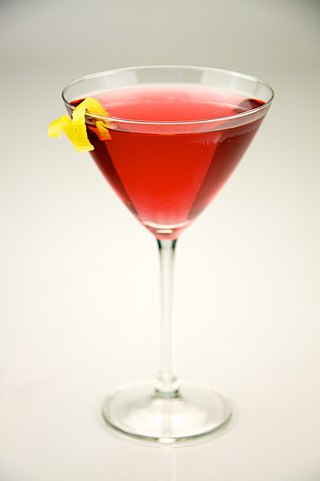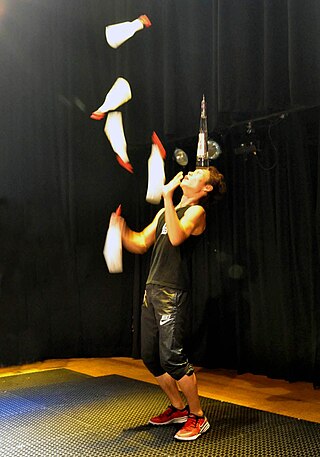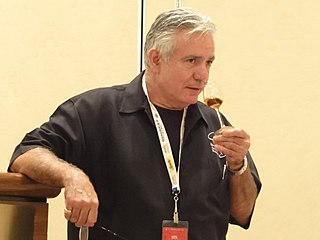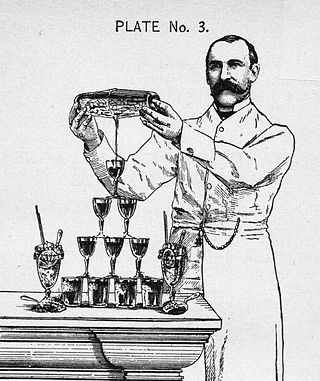Related Research Articles

Waiting staff (BrE), waiters / waitresses, or servers (AmE) are those who work at a restaurant, a diner, or a bar and sometimes in private homes, attending to customers by supplying them with food and drink as requested. Waiting staff follow rules and guidelines determined by the manager. Waiting staff carry out many different tasks, such as taking orders, food-running, polishing dishes and silverware, helping bus tables, entertaining patrons, restocking working stations with needed supplies, and handing out the bill.

The martini is a cocktail made with gin and vermouth, and garnished with an olive or a lemon twist. Over the years, the martini has become one of the best-known mixed alcoholic beverages. A popular variation, the vodka martini, uses vodka instead of gin for the cocktail's base spirit.

A cosmopolitan, or, informally, a cosmo, is a cocktail made with vodka, Cointreau, cranberry juice, and freshly squeezed or sweetened lime juice.

A bartender is a person who formulates and serves alcoholic or soft drink beverages behind the bar, usually in a licensed establishment as well as in restaurants and nightclubs, but also occasionally at private parties. Bartenders also usually maintain the supplies and inventory for the bar. As well as serving beer and wine, a bartender can generally also mix classic cocktails such as a Cosmopolitan, Manhattan, Old Fashioned, and Mojito.

A cocktail glass is a stemmed glass with an inverted cone bowl, mainly used to serve straight-up cocktails. The term cocktail glass is often used interchangeably with martini glass, despite their differing slightly. Today, the glass is used to serve a variety of cocktails, such as the martini and its variations, Manhattan, Brandy Alexander, pisco sour, Negroni, cosmopolitan, gimlet, and the grasshopper.

Flair bartending is the practice of bartenders entertaining guests, clientele or audiences with the manipulation of bar tools and liquor bottles in tricky, dazzling ways. Used occasionally in cocktail bars, the action requires skills commonly associated with jugglers. It has become a sought-after talent among venue owners and marketers to help advertise a liquor product or the opening of a bar establishment. Competitions have been sponsored by liquor brands to attract flair bartenders, and some hospitality training companies hold courses to teach flair techniques.

Various unique terminology is used in bartending.

Dale DeGroff, also known as "the King of Cocktails" or "King Cocktail", is an American bartender and author. The New York Times in 2015 called DeGroff "one of the world's foremost cocktail experts", and wrote that his book The Craft of the Cocktail is considered an essential bartending reference. From 1987 to 1999 DeGroff rose to prominence as the original chief bartender in the Rainbow Room at Rockefeller Center in New York City, where his then-unusual emphasis on classic cocktail recipes and high-quality ingredients led to substantial acclaim and emulation by many other bars in New York City and beyond, and helped influence the creation of the craft cocktail movement.

A lemon drop is a vodka-based cocktail that has a lemony, sweet and sour flavor, prepared using vodka, triple sec, and fresh lemon juice. It has been described as a variant of, or as "a take on", the vodka martini, but is in fact closer to a white lady variant. It is typically prepared and served straight up – chilled with ice and strained.

Mr. Boston Official Bartender's Guide is a cocktail recipe book and bartending manual first published in 1935. The guide was once used on nearly every bar shelf in the United States. About 11 million copies were printed in 68 editions, as of 2015.

A well drink or rail drink is an alcoholic beverage or mixed drink made using the lower-cost liquors stored within easy reach of the bartender in the bar's "speed rail", "speed rack", or "well", a rack or shelf at a lower level than the bar that the bartender uses to prepare drinks. In any given establishment, the rail/well liquors available may also be known as the "house pours", "house brands", "house spirits", "pour brands", or "proprietary spirits".
Bartending school refers to private education businesses that teach individuals the many intricacies of serving customers alcohol from behind a bar. This includes not only classes in such topics as drinks mixology: the intricacies of mixing drinks and drink presentation, and the alcohol laws of the city and state, or province, in which the school is situated.
Colin Peter Field is a bartender and author who has been ranked as best bartender in the world by Forbes and Travel + Leisure magazines. He is the head bartender at the Hemingway Bar of the Hôtel Ritz Paris, voted Best of the Best Bar in the World by Virtuoso in Las Vegas in 2016, and has invented several drinks, such as the Picasso Martini, Highland Cream, Serendipity and Clean Dirty Martini. He is involved in the training of students for bartending in France and in Switzerland, and has authored the books The Cocktails of the Ritz Paris and Cocktails, A Simple Story.

VA-11 Hall-A: Cyberpunk Bartender Action is a 2016 visual novel developed by Venezuelan studio Sukeban Games and published by Ysbryd Games. The game was initially released for Microsoft Windows, OS X, and Linux on June 21, 2016, and ports were later released for PlayStation Vita, PlayStation 4, and Nintendo Switch, with the Vita port developed by Wolfgame and published by Limited Run Games. The game puts the player in the role of a bartender at the eponymous VA-11 Hall-A, a small bar in a dystopian downtown which is said to attract the "most fascinating" of people. Gameplay consists of players making and serving drinks to bar attendees while listening to their stories and experiences.

Cheryl Charming is an American bar professional and published author of 16 books on cocktails and bartending. She currently works as the Bar Director at the Bourbon "O” Bar in New Orleans, Louisiana, and in 2014 was named the New Orleans Magazine Mixologist of the Year. She is nationally known for her bartending and books.

Ada Coleman (1875–1966) was head bartender at the Savoy Hotel in London for 23 years, one of only two women to have held that position. While working at the Savoy, she invented the "hanky panky", a distinctive variation on the sweet martini cocktail.

Harry Johnson was an American bartender who owned and operated saloons across the US in the late 19th century and the early 20th century. He is best known for the New and Improved Bartenders' Manual, an influential book that contained many original cocktail recipes, as well as the first written recipes of such cocktails as the marguerite and a version of the martini. Perhaps even more importantly, it was the first book to offer bar management instructions. Johnson opened the first ever consulting agency for bar management. Imbibe magazine has called him one of the most influential cocktail personalities of the last 100 years, and he has been called "the father of professional bartending".
Audrey Saunders is an American bartender, considered one of the world's most famous bartenders. She is most well known as the operating partner and creative lead of Pegu Club, a bar in New York City from 2005 to 2020. The bar was one of the most influential in the United States. Since its closure, Saunders and her husband have been developing a retreat for beverage industry members in rural Washington state.

The craft cocktail movement is a social movement spurred by the cocktail renaissance, a period of time in the 21st century characterized by a revival and re-prioritization of traditional recipes and methods in the bar industry, especially in the United States. The renaissance spanned from the early 2000s into the late 2010s. A stricter range is 2004 to 2017: by 2017, high-quality ingredients, techniques, and liquors began to be ubiquitous in bars across the United States, leading writers to declare the renaissance over.
Angel's Share was a speakeasy-style bar in the East Village of Manhattan, New York City. The Japanese-style bar was one of the pioneering establishments in the cocktail renaissance.
References
- ↑ Cassavoy, Liane; magazine, Entrepreneur (2013-12-24). Start Your Own Bar and Club. Entrepreneur Press. ISBN 978-1-59918-519-4.
- 1 2 Tunstall, Chris. "What is a Barback? The Ultimate Guide to the Bartender's Sidekick". A Bar Above. Retrieved 6 October 2017.
- ↑ What is the Legal Bartending Age? Nexgen, 2006-12-05.
